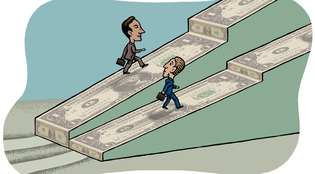 loading
loading
FindingsWhen the bad times roll Gregory NemecView full imageIn 2000, Lisa Kahn was finishing her freshman year at the University of Chicago. She watched as the graduating seniors got a string of incredible job offers. But just a year later, in the midst of the 2001 recession, many seniors seemed to have no offers at all. "I thought, 'That's too bad -- how's that going to affect them in the future?'" Kahn recalls. "It turns out there was no answer to that." There is now. As part of her recent doctoral research, Kahn, now an assistant professor of economics at the School of Management, compared students who graduated from college during tough economic times with those who graduated during a boom. Using the federal Bureau of Labor Statistics' National Longitudinal Survey of Youth, Kahn analyzed the wages of white males who graduated before, during, and after the 1980s recession. She found that, for every 1 percent increase in the national unemployment rate at the time of students' graduation, their wages in the first year after college decreased by 6 to 8 percent. And, as Kahn describes in a working paper that has been submitted to an economics journal, the damage is unexpectedly long lasting. Fifteen years after finishing college, recession-era graduates are still making 2.5 percent less than their luckier counterparts. Kahn suspects that students who graduate into a poor economy may not be able to get jobs in their preferred fields, or may be forced to take lower-level positions than they'd otherwise qualify for, and it may be several years before they can get the kinds of jobs they originally wanted. Meanwhile, she says, their "counterparts who were able to go right into their chosen occupations have been investing in skills. When you eventually go back into your field, you're behind." It's too early to know whether the same trends will apply to students graduating into our currently dismal economy. But Kahn isn't optimistic. "I think a lot of signs point to 'yes,' unfortunately."
The comment period has expired.
|
|